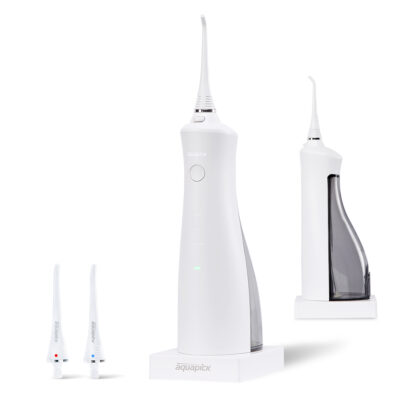Aquapick
Avoid These Common Flossing Mistakes
Inter-dental cleaning is a critical part of maintaining a healthy mouth. Although string floss can be challenging, it’s still one of the most important measures you can take to prevent oral disease. Flossing scrapes plaque and bacteria off gums and teeth in ways a toothbrush cannot. If performed regularly, you can prevent the build-up of tartar, which can only be removed by a dentist. Avoid these common flossing mistakes to keep yourself on the path toward better oral health.
Not Flossing Enough
Flossing twice a day is good. However, since people often eat more than that, flossing after every meal is even better. The central oral health threat that flossing targets is gum disease, cavity-causing tartar. This hard substance is produced by bacteria populations sustained in the mouth by sugars in food remnants. The more people eat, the more they feed these bacteria. Removing them as frequently as they are introduced is the best strategy.
Flossing Too Hard
Many people make the mistake of thinking forceful, vigorous movements will make the floss clean more effectively. Removing debris from the spaces between teeth and gums is best accomplished with gentle up and down scraping motions on all sides of the teeth and below gums. This loosens food debris, bacteria, and plaque, while massaging gums instead of injuring them. Flossing too forcefully may lacerate gums or cause them to recede. It can also cause increased tooth sensitivity, as tooth enamel is gradually worn away. All three cases leave teeth and gums more vulnerable to infection, so be gentle.
Flossing After Brushing
When you floss before brushing, you increase the effectiveness of your toothbrush. Since the individual bristles alone are unable to loosen and remove food particles and bacteria as well floss, flossing after you have brushed just leaves food debris and bacteria hanging around until the next cleaning. This definitely leaves your mouth unclean. However, beginning with flossing changes that dynamic. Loosened food debris and bacteria can now be more easily brushed away. Flossing before brushing reduces the amount of plaque you actually swallow and it allows toothpaste fluoride to adhere more strongly to your teeth.
While string flossing is an extremely important part of maintaining oral hygiene, especially when used in tandem with regular brushing and dental visits, the difficulty of execution is discouraging to many. Water flossing can be an excellent complement to, or highly effective replacement for, regular string flossing.

![]()


